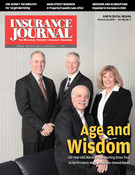More Straight-Line Winds Ahead
“Based on what we know about the potential patterns of climate change, we expect severe storm activity to increase in Texas and the Midwest, including higher activity of straight-line winds with potentially damaging effects.”
—Dr. Harold Brooks of the National Severe Storms Laboratory (NSSL). Speaking at a conference at Southern Methodist University’s Cox School of Business sponsored by the Willis Research Network, Brooks said that straight-line winds – the violent air currents that usually accompany thunderstorms and are produced when areas of low and high pressure collide – represent a growing threat to homes and businesses. Compared with hurricanes, tornadoes and, to a lesser extent, hail, such winds are a relatively small contributor to structural damage at present. Brooks said, however, that as the climate changes, NSSL researchers believe these events will become more frequent and therefore contribute more significantly to overall damage.
Share the Road Safely
“We want the drivers of big rigs and buses and those who share the roads with them to be safe.”
—U.S. Transportation Secretary Ray LaHood announced recently that the U.S. government has banned hand-held “texting” by drivers of large commercial trucks and buses to avoid the danger of distracted driving. It follows a similar ban in December for drivers of federal government vehicles. LaHood said the prohibition “is an important safety step and we will be taking more to eliminate the threat of distracted driving.” The new ban carries fines of up to $2,750. The National Safety Council, a research and advocacy group, estimates that 200,000 crashes of all types on U.S. roads are caused by drivers who are “texting.”
Helping Employers Compete
“The workers’ compensation industry is no longer as productive as it needs to be for us to be competitive. We must take care of our workforce and help employers compete.”
—Oklahoma state Rep. Lewis Moore, R-Edmond, said a bill he has filed combining health and workers’ compensation insurance coverage for employees will allow around-the-clock health coverage and “fast forward” reform of the workers’ comp system in that state. Moore’s House Bill 2886 would make it possible for the Oklahoma State Employees Benefits Council and the Oklahoma State and Education Employees Group Insurance Board to begin a pilot program that state agencies and employers can participate in to take advantage of the 24/7 provision in Title 85. Moore said a large chunk of the employee benefits portion of the budget could be reduced without hurting state employees’ coverage if his legislation passes.
Topics USA Workers' Compensation Oklahoma
Was this article valuable?
Here are more articles you may enjoy.


 Lawyer for Prominent Texas Law Firm Among Victims ID’d in Maine Plane Crash
Lawyer for Prominent Texas Law Firm Among Victims ID’d in Maine Plane Crash  What Analysts Are Saying About the 2026 P/C Insurance Market
What Analysts Are Saying About the 2026 P/C Insurance Market  Q4 Global Commercial Insurance Rates Drop 4%, in 6th Quarterly Decline: Marsh
Q4 Global Commercial Insurance Rates Drop 4%, in 6th Quarterly Decline: Marsh  Allstate CEO Wilson Takes on Affordability Issue During Earnings Call
Allstate CEO Wilson Takes on Affordability Issue During Earnings Call 


